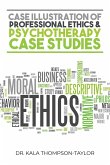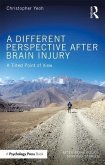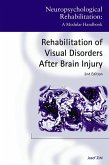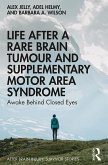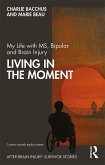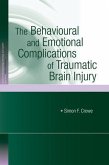Jose Leon-Carrion, Klaus R. H. von Wild, George A. Zitnay
Brain Injury Treatment
Theories and Practices
Jose Leon-Carrion, Klaus R. H. von Wild, George A. Zitnay
Brain Injury Treatment
Theories and Practices
- Broschiertes Buch
- Merkliste
- Auf die Merkliste
- Bewerten Bewerten
- Teilen
- Produkt teilen
- Produkterinnerung
- Produkterinnerung
Explains the treatments used in brain injury rehabilitation and covers new methods of rehabilitation, including complementary medicine theories.
Andere Kunden interessierten sich auch für
![Case Illustration of Professional Ethics & Psychotherapy Case Studies Case Illustration of Professional Ethics & Psychotherapy Case Studies]() Kala Thompson-TaylorCase Illustration of Professional Ethics & Psychotherapy Case Studies12,99 €
Kala Thompson-TaylorCase Illustration of Professional Ethics & Psychotherapy Case Studies12,99 €![A Different Perspective After Brain Injury A Different Perspective After Brain Injury]() Christopher YeohA Different Perspective After Brain Injury50,99 €
Christopher YeohA Different Perspective After Brain Injury50,99 €![The Causation and Treatment of Psychopathic Diseases The Causation and Treatment of Psychopathic Diseases]() Boris SidisThe Causation and Treatment of Psychopathic Diseases35,99 €
Boris SidisThe Causation and Treatment of Psychopathic Diseases35,99 €![Rehabilitation of Visual Disorders After Brain Injury Rehabilitation of Visual Disorders After Brain Injury]() Josef ZihlRehabilitation of Visual Disorders After Brain Injury77,99 €
Josef ZihlRehabilitation of Visual Disorders After Brain Injury77,99 €![Life After a Rare Brain Tumour and Supplementary Motor Area Syndrome Life After a Rare Brain Tumour and Supplementary Motor Area Syndrome]() Alex JellyLife After a Rare Brain Tumour and Supplementary Motor Area Syndrome36,99 €
Alex JellyLife After a Rare Brain Tumour and Supplementary Motor Area Syndrome36,99 €![My Life with MS, Bipolar and Brain Injury My Life with MS, Bipolar and Brain Injury]() Charlie BacchusMy Life with MS, Bipolar and Brain Injury40,99 €
Charlie BacchusMy Life with MS, Bipolar and Brain Injury40,99 €![The Behavioural and Emotional Complications of Traumatic Brain Injury The Behavioural and Emotional Complications of Traumatic Brain Injury]() Simon F. CroweThe Behavioural and Emotional Complications of Traumatic Brain Injury80,99 €
Simon F. CroweThe Behavioural and Emotional Complications of Traumatic Brain Injury80,99 €-
-
-
Explains the treatments used in brain injury rehabilitation and covers new methods of rehabilitation, including complementary medicine theories.
Hinweis: Dieser Artikel kann nur an eine deutsche Lieferadresse ausgeliefert werden.
Hinweis: Dieser Artikel kann nur an eine deutsche Lieferadresse ausgeliefert werden.
Produktdetails
- Produktdetails
- Verlag: Taylor & Francis
- Seitenzahl: 606
- Erscheinungstermin: 20. Dezember 2013
- Englisch
- Abmessung: 234mm x 156mm x 32mm
- Gewicht: 907g
- ISBN-13: 9780415653701
- ISBN-10: 0415653703
- Artikelnr.: 36541907
- Herstellerkennzeichnung
- Libri GmbH
- Europaallee 1
- 36244 Bad Hersfeld
- gpsr@libri.de
- Verlag: Taylor & Francis
- Seitenzahl: 606
- Erscheinungstermin: 20. Dezember 2013
- Englisch
- Abmessung: 234mm x 156mm x 32mm
- Gewicht: 907g
- ISBN-13: 9780415653701
- ISBN-10: 0415653703
- Artikelnr.: 36541907
- Herstellerkennzeichnung
- Libri GmbH
- Europaallee 1
- 36244 Bad Hersfeld
- gpsr@libri.de
Jose Leon-Carrion is Professor of Neuropsychology and Director of the Human Neuropsychology Laboratory at the University of Seville, Spain. At the Center for Brain Injury Rehabilitation (C.RE.CER.) in Seville, an interdisciplinary center for rehabilitation, he is responsible for the design of the rehabilitation programs and director of the Department of Research, Development and Innovation. He was vice-president of the International Brain Injury Association (IBIA) and is currently Secretary General on the Board of Directors of IBIA. He also was president of the Academy for the Advancement of Brain Injury Rehabilitation. George A. Zitnay is Clinical Professor at the Medical College of Virginia, he is the immediate past President of the Brain Injury Association of America, Founder and immediate past President of the International Brain Injury Association, Chairman of the WHO Neurotrauma Committee, former Chairman of the Council of the Medical Rehabilitation Center at NIH, Chairman of the National Brain Injury Research, Treatment and Training Foundation, former Professor and Director of Research at the Department of Neurosurgery at the University of Virginia, author, lecturer and member of editorial board of journal, Brain Injury. Klaus von Wild is Professor and Head Neurosurgical, Department for Neurosurgery and Early Neurotraumatological Rehabilitation, Clemenshospital, Teaching Hospital, Westphalian Wilhelms University Munster.
Prehospital Management of Traumatic Brain Injury. Mild Brain Injury:
Detecting High Risk Patients. Organization of Neurological Intensive Care
Units. Current Concepts and Strategies on Early Neurohabilitation for
Patients with Traumatic Injury (TBI). Electrical Treatment of Coma.
Low-level responsive states. Diagnosing and treating affective disorders
after brain injury, Sleep Disorders in Patients with Traumatic Brain
Injury. Rehabilitation of Equilibrium and Posture Control after Brain
Injury. Neuropharmacological Management of Impairment after Traumatic Brain
Injury. Spasticity of Cerebral Origin. Rehabilitation in Water.
Neuropsychological Assessment of Persons with Acquired Brain Injury.
Sevilla Neuropsychological test-Battery (BNS) for the assessment of
Executive Functioning.Methods and Tools for the Assessment of Outcome after
Brain Injury Rehabilitation. Assessment of Response Bias in Impairment and
Disability Examinations. Rehabilitation of Cognitive Disorders after
Acquired Brain Injury: The Combine Method (TCM). Neuropsychological
Recovery: Children & Adolescents Following Traumatic Brain Injury. Medical
Rehabilitation of TBI after Intensive. The holistic, multidisciplinary and
intensive approach of treatment: the CRECER method. The Role of Stem Cells
in the Rehabilitation of Brain Injury. Complementary Medicine and TBI. The
Role of Family in the Rehabilitation of Traumatic Brain Injury Patients:
Advocate or Co-Therapist. Return to Work after Brain Injury
Detecting High Risk Patients. Organization of Neurological Intensive Care
Units. Current Concepts and Strategies on Early Neurohabilitation for
Patients with Traumatic Injury (TBI). Electrical Treatment of Coma.
Low-level responsive states. Diagnosing and treating affective disorders
after brain injury, Sleep Disorders in Patients with Traumatic Brain
Injury. Rehabilitation of Equilibrium and Posture Control after Brain
Injury. Neuropharmacological Management of Impairment after Traumatic Brain
Injury. Spasticity of Cerebral Origin. Rehabilitation in Water.
Neuropsychological Assessment of Persons with Acquired Brain Injury.
Sevilla Neuropsychological test-Battery (BNS) for the assessment of
Executive Functioning.Methods and Tools for the Assessment of Outcome after
Brain Injury Rehabilitation. Assessment of Response Bias in Impairment and
Disability Examinations. Rehabilitation of Cognitive Disorders after
Acquired Brain Injury: The Combine Method (TCM). Neuropsychological
Recovery: Children & Adolescents Following Traumatic Brain Injury. Medical
Rehabilitation of TBI after Intensive. The holistic, multidisciplinary and
intensive approach of treatment: the CRECER method. The Role of Stem Cells
in the Rehabilitation of Brain Injury. Complementary Medicine and TBI. The
Role of Family in the Rehabilitation of Traumatic Brain Injury Patients:
Advocate or Co-Therapist. Return to Work after Brain Injury
Prehospital Management of Traumatic Brain Injury. Mild Brain Injury:
Detecting High Risk Patients. Organization of Neurological Intensive Care
Units. Current Concepts and Strategies on Early Neurohabilitation for
Patients with Traumatic Injury (TBI). Electrical Treatment of Coma.
Low-level responsive states. Diagnosing and treating affective disorders
after brain injury, Sleep Disorders in Patients with Traumatic Brain
Injury. Rehabilitation of Equilibrium and Posture Control after Brain
Injury. Neuropharmacological Management of Impairment after Traumatic Brain
Injury. Spasticity of Cerebral Origin. Rehabilitation in Water.
Neuropsychological Assessment of Persons with Acquired Brain Injury.
Sevilla Neuropsychological test-Battery (BNS) for the assessment of
Executive Functioning.Methods and Tools for the Assessment of Outcome after
Brain Injury Rehabilitation. Assessment of Response Bias in Impairment and
Disability Examinations. Rehabilitation of Cognitive Disorders after
Acquired Brain Injury: The Combine Method (TCM). Neuropsychological
Recovery: Children & Adolescents Following Traumatic Brain Injury. Medical
Rehabilitation of TBI after Intensive. The holistic, multidisciplinary and
intensive approach of treatment: the CRECER method. The Role of Stem Cells
in the Rehabilitation of Brain Injury. Complementary Medicine and TBI. The
Role of Family in the Rehabilitation of Traumatic Brain Injury Patients:
Advocate or Co-Therapist. Return to Work after Brain Injury
Detecting High Risk Patients. Organization of Neurological Intensive Care
Units. Current Concepts and Strategies on Early Neurohabilitation for
Patients with Traumatic Injury (TBI). Electrical Treatment of Coma.
Low-level responsive states. Diagnosing and treating affective disorders
after brain injury, Sleep Disorders in Patients with Traumatic Brain
Injury. Rehabilitation of Equilibrium and Posture Control after Brain
Injury. Neuropharmacological Management of Impairment after Traumatic Brain
Injury. Spasticity of Cerebral Origin. Rehabilitation in Water.
Neuropsychological Assessment of Persons with Acquired Brain Injury.
Sevilla Neuropsychological test-Battery (BNS) for the assessment of
Executive Functioning.Methods and Tools for the Assessment of Outcome after
Brain Injury Rehabilitation. Assessment of Response Bias in Impairment and
Disability Examinations. Rehabilitation of Cognitive Disorders after
Acquired Brain Injury: The Combine Method (TCM). Neuropsychological
Recovery: Children & Adolescents Following Traumatic Brain Injury. Medical
Rehabilitation of TBI after Intensive. The holistic, multidisciplinary and
intensive approach of treatment: the CRECER method. The Role of Stem Cells
in the Rehabilitation of Brain Injury. Complementary Medicine and TBI. The
Role of Family in the Rehabilitation of Traumatic Brain Injury Patients:
Advocate or Co-Therapist. Return to Work after Brain Injury


